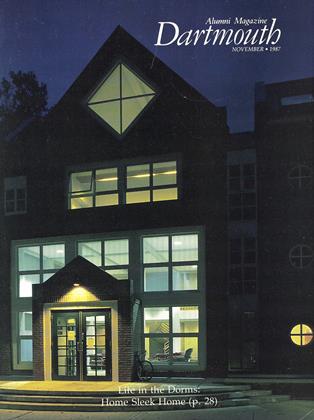Global Chicken
In this passage from "Beyond Sovereignty The Challenge of Global Policy" (University of South Carolina Press), Marvin S. Soroos '67, political science professor at North Carolina State, illustrates the anarchism of international "power politics."
An interdependent community of states can be likened to the heavily used network of streets in a densely populated urban area. Imagine what the flow of traffic will be like if there are no traffic rules and each operator of a vehicle and each pedestrian is left to his own means to reach his destination. The more daring drivers would perhaps resort to a game of "chicken" in which they lay on their horns and accelerate wildly in hopes of intimidating less aggressive drivers and pedestrians into clearing the way for fear of being hit. Inevitable collisions would take place, causing deaths, injuries and paralyzing traffic jams; and nobody would reach his destination without major delays. Playing chicken in traffic has some parallels with engaging in games of power politics in an interdependent world.
Dreams and Fruit
"Clayfeld Rejoices, Clayfeld Laments," Robert Pack '51's ninth collection of verse (David R. Godine, Publisher), is his most colloquial workto date. In this excerpt from the poem "Clayfield's Dream," Pack's halfeveryman half-picaresque hero marries sensual reality with the artist'screative process.
Clayfeld was thirty when he started to record his dreams, hoping for insight into why he fell in love with women who did not return his love. He kept his dream-book and an orange by his bed; waking, he'd sniff the orange, quarter it, bite so his teeth would scrape against the pulpy white inside the peel, and let his dream flow out revealed upon the page.
Country Socializing
"The Progressive Yankees," by Dartmouth History Professor JamesWright (University Press of New England), examines sweeping progressive reforms both social and economic instituted by the NewHampshire Republican Party in the early 1900s. In this passage, Wrightdescribes the Upper Valley town of Cornish along with its most famousresident of the time, best-selling novelist Winston Churchill.
Cornish was a picturesque Connecticut River valley town that had recently been discovered by urbanites; it was a stimulating, fascinating place in the early years of the new century. Churchill regularly socialized with other "outsiders" in Cornish, artists such as Augustus Saint-Gaudens, Maxfield Parrish, and Henry Oliver Walker, poets such as Emma Lazarus and Percy Mackaye, writers such as Herbert Croly, and publishers such as Norman Hapgood. Lawyers George Rublee and Learned Hand would join them shortly. President Theodore Roosevelt visited Churchill in 1902. Presumably Churchill and the president discussed politics, history, and letters, their common interests. At the time of Roosevelt's visit Churchill already had placed his candidacy for the state house of representatives before his townsmen.
Algal Art
Journalism of Hope
Peter Pritchard '66 is a managing editor of USA Today. He has writtena book, "The Making of McPaper" (Andrews, McMeel and Parker), thattells the newspaper's history from its high-risk startup in 1982 to itspresent readership of 4.8 million. This segment recalls a moment whenthe paper's chairman, Al Neuharth, revealed his willfully upbeat approach to journalism.
In October 1983, when USA TODAY was a little more than one year old, Neuharth made a controversial speech at the Overseas Press Club in New York City. In it, he asked whether what he called the "old journalism of despair" "the derisive technique of leaving readers discouraged, or mad, or indignant should survive or thrive in the eighties and nineties."
To replace the "old journalism of despair" Neuarth proposed a "new journalism of hope." He defined it as an approach that "chronicles the good, the bad, and the otherwise, and leaves readers fully informed and equipped to judge what deserves their attention and support."
Television's Riches
Tim Brooks '64, director of program research for NBC-TV, has written"The Complete Directory to Prime Time TV Stars" (Ballantine, a volume with information on more than 8,500 television stars from 1946on. In his introduction, Brooks argues that his medium deserves morerespect.
Television, the medium that only the people love, has created a galaxy of stars during the last four decades. Some, like Murrow and Moyers and Susskind and Serling, have used it as a vehicle for thoughtful, intelligent expression, and helped make the world a better place for us all. Most, like Telly and Lucy and Uncle Miltie and Johnny Carson, are (or were) primarily entertainers, seeking only to give us some harmless diversion at the end of a hard day. A few, like Bill Cosby and Michael Landon, God bless 'em, have successfully pursued both goals entertaining, but at the same time leaving their viewers a little richer in life's experiences. Pay no attention to cynics who decry television as just a "vast wasteland." Quality sells.
The alga Triploceras gracile appears in "Flora of NewZealand, Volume I: Desmids" (V. R. Ward), illustrated bylong-time biology professor Hannah Crosdale.
 View Full Issue
View Full Issue
More From This Issue
-
 Feature
FeatureTaking the Sky
November 1987 By Glenn Tremml '82 -
 Feature
FeatureAfter Iran: Can We Have a Foreign Policy?
November 1987 By Stephen Bosworth '61 -
 Feature
FeatureAre Conservatives Being Silenced?
November 1987 By Lee Michaelides -
 Feature
FeatureRooming with Style
November 1987 By Karen Endicott -
 Feature
FeatureCreating Creators
November 1987 By Lawrence Biemiller -
 Feature
FeatureThe Right Man at the Right Time
November 1987







